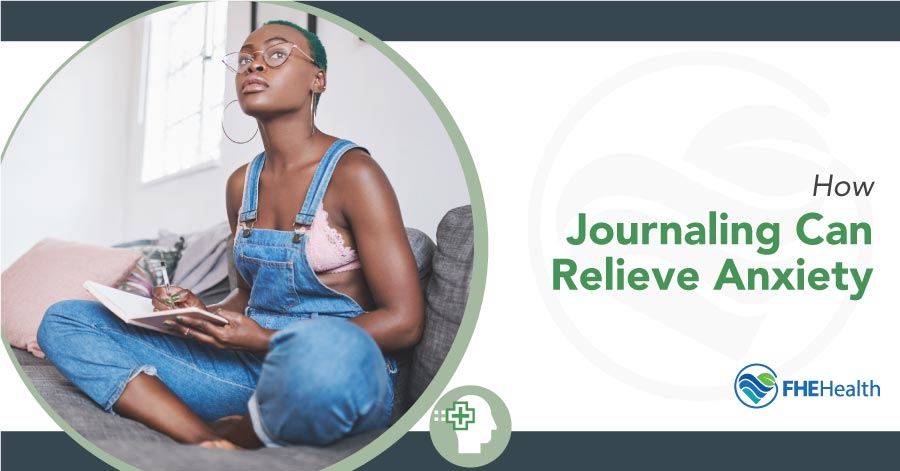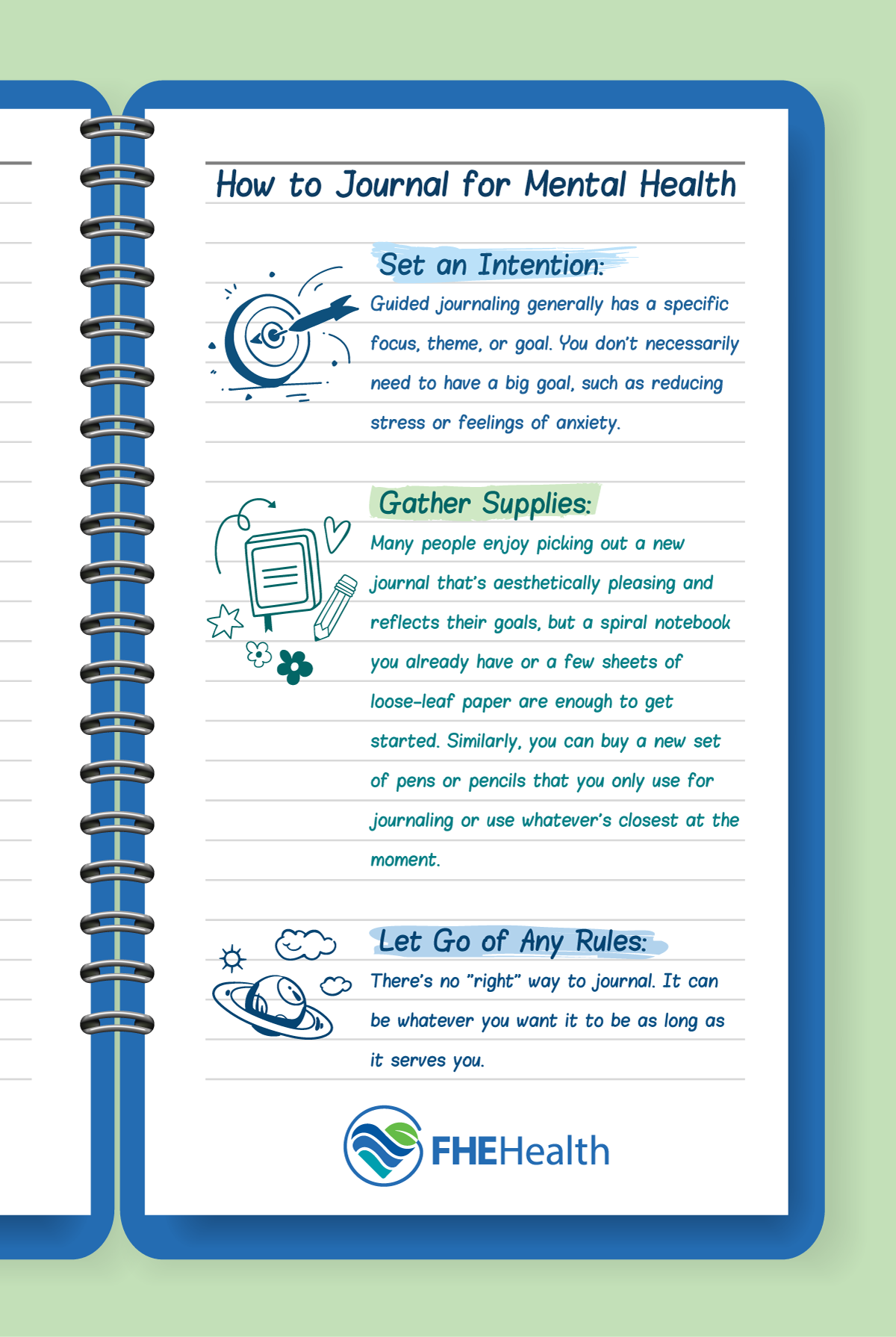
Some of the most common advice you’ll hear for managing anxiety is to keep a journal. We admit it — this self-care practice is often easier said than done. If you’ve never tried journaling before, it can be hard to know when to start, how often you should be doing it and what you should even be writing about.
It may even seem like it’s just adding one more item to your daily to-do list, which could cause even more stress. However, journaling for anxiety is a mindfulness exercise that could improve your sense of well-being in both the short and the long term.
Our team at FHE endorses a number of natural options for treating anxiety, including meditation, yoga, breathing exercises and acupuncture. Journaling is another simple, affordable and effective method you can add to your mental health arsenal.

Why Does Journaling Help?
There are some well-known benefits of keeping a journal or diary. Writing down your thoughts boosts mindfulness by having you focus on the present moment. Regular writing also improves self-awareness and communication skills as you learn how to accurately express your inner feelings.
According to the New York Times, studies have shown that journaling can lead to additional rewards, including better sleep, a stronger immune system and a higher IQ.
Journaling as a daily practice offers a great way to organize your thoughts and help you keep track of your responsibilities. Many people choose to start their morning by writing down their goals for the day. Others end their night with a journaling ritual to recap the day’s events.
The main purpose of journaling is to make sense of your thoughts and feelings by putting them down on paper. This can be done at any time throughout the day.
So, journaling can help with productivity, organization and personal reflection, but does journaling help with anxiety? The short answer is yes — it can help in many ways.
Journaling for Immediate Anxiety Relief
In moments of anxiety, sitting down to journal can be a grounding experience, bringing your focus back to the present moment. By articulating your fears, you can better understand what’s causing the anxious episode in the first place.
Writing out your physical symptoms is also useful as you can see how anxiety manifests itself in your body. Bringing attention to specific issues, like shortness of breath, muscle tension or increased heart rate, can help you regulate the symptoms.
The University of Rochester Medical Center explains how keeping an anxiety diary can help you recognize triggers and learn how to control them. You can review previous entries with a mental health professional or by yourself.
Pay attention to what happened before, during and after anxiety set in, and identify any patterns that have occurred over time. This could lead to new revelations about how you can best manage anxiety in the future.
Journaling to Prevent Future Stress
Speaking of the future, you can also journal as a preventive measure. At times when you’re in a good place mentally, try writing down the day’s successes or positive affirmations to enhance that sense of well-being. Writing out a schedule or to-do list for the next day or week can give you a sense of control over your obligations.
If you feel anxiety creeping in, stress journaling can also be a useful tool. What do you anticipate causing anxiety in your future? Try writing through these feelings and figure out ways you can tackle the issue before it becomes an overwhelming force in your life.
How to Journal for Anxiety: Getting Started
Remember, your journal can be whatever you want it to be. You can journal as often and for as long as you see fit. An anxiety journal is a personal tool, so it should be personalized to fit your needs.
Here are a few popular journaling techniques you can try to see what works for you.
1. The traditional diary
You might have kept a private diary as a child or teenager. If not, you may have read your older sister’s. Either way, this is the most common type of journal people keep.
It’s essentially a stream-of-consciousness journal where you write out whatever comes to mind. An entry could be anywhere from a few sentences to a few pages in length, depending on what thoughts are occupying your brain at that moment.
2. Bullet journal
For those low on time or who prefer to write in shorthand, a bullet journal might be the way to go. This is simply a compilation of lists. The options are virtually endless, but many people keep track of their daily tasks, sleep patterns, and water and food intake.
You can also use the journal to log your emotions throughout the day or memories that come to mind, or do a brain dump and write down everything that’s stressing you out.
3. Artistic journal
Do you have a hard time putting your thoughts into words? An artistic journal can help with that. Oftentimes, people sketch a combination of words, doodles, shapes and scribbles throughout the pages. It doesn’t have to be beautiful; just use the space to bring your feelings to life.
More Tips for Keeping an Anxiety Journal
Say no to pressure, but yes to accountability
Getting into a new habit takes consistency, but journaling shouldn’t feel like a chore. To get started, try setting an alarm for the same time each day to do some writing. Stay there as long as you want, whether you have 5 minutes or an hour to spare. If this adds extra stress to your life, try journaling once a week or in moments of anxiety instead.
Get a journal that suits your style
Find a notebook with a design you actually like. The same goes for your writing utensil. This can make the journaling process feel more personal and fun, and it may also make you more likely to bring your diary with you wherever you go.
If all else fails, look up writing prompts
If you really want to make journaling a part of your routine but find yourself suffering from writer’s block, a quick internet search can provide plenty of inspiration. Search for journaling prompts and find some that resonate with you.
Tools like journaling may not be enough to help with your anxiety, so don’t be afraid to reach out for help. Contact us today at FHE Health by calling. Our compassionate team of counselors is standing by 24/7 to take your call.






